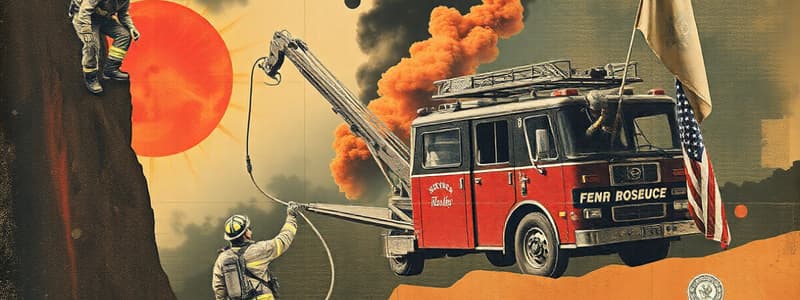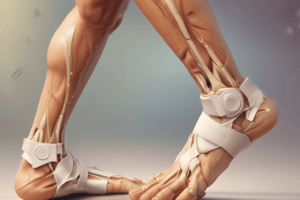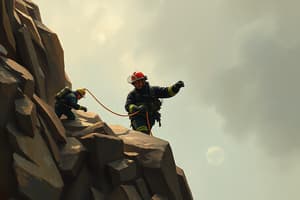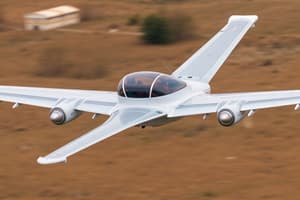Podcast
Questions and Answers
What is the purpose of a safety line system in rescue operations?
What is the purpose of a safety line system in rescue operations?
- To transport equipment to the rescue site.
- To provide a means of communication between rescuers.
- To serve as an independent anchor and support system for rescuers. (correct)
- To ensure the safety of bystanders during a rescue.
What is the primary responsibility of all Spring Fire Department personnel regarding the high and low angle rescue operations?
What is the primary responsibility of all Spring Fire Department personnel regarding the high and low angle rescue operations?
- To lead the incident command team
- To ensure the rescue equipment is stored correctly
- To ensure the review of the guidelines annually
- To know and comply with the established guidelines (correct)
Which of the following is NOT a requirement for members of the Safety Team?
Which of the following is NOT a requirement for members of the Safety Team?
- To construct and operate safety rope systems during a rescue.
- To be trained to operations levels of NFPA 1670.
- To be trained to operations levels of NFPA 1006.
- To have a history of prior rescue operations. (correct)
What is the role of the Safety Officer during a rescue operation?
What is the role of the Safety Officer during a rescue operation?
Which of the following is NOT one of the tactical priorities during a high angle rescue operation?
Which of the following is NOT one of the tactical priorities during a high angle rescue operation?
What defines the anchor point in rope rescue operations?
What defines the anchor point in rope rescue operations?
What equipment is contained in the Safety Line Bag?
What equipment is contained in the Safety Line Bag?
Which statement is true regarding the Rescue Team?
Which statement is true regarding the Rescue Team?
What is the purpose of the evacuation harness in rescue operations?
What is the purpose of the evacuation harness in rescue operations?
What is a Munter hitch primarily used for in a safety line system?
What is a Munter hitch primarily used for in a safety line system?
Which components are classified as 'hardware' in rope rescue equipment?
Which components are classified as 'hardware' in rope rescue equipment?
What does the term 'ground control' refer to in the context of high angle rescue operations?
What does the term 'ground control' refer to in the context of high angle rescue operations?
Which of the following roles cannot perform the construction or operation of lowering, hauling, or safety rope systems?
Which of the following roles cannot perform the construction or operation of lowering, hauling, or safety rope systems?
What type of inspections are required for life safety ropes?
What type of inspections are required for life safety ropes?
How often should the guidelines for high & low angle rescue operations be reviewed?
How often should the guidelines for high & low angle rescue operations be reviewed?
What is the primary function of a hauling system in rescue operations?
What is the primary function of a hauling system in rescue operations?
What is the primary responsibility of the Incident Commander at a rescue event?
What is the primary responsibility of the Incident Commander at a rescue event?
Which role is NOT specifically mentioned as a responsibility of the Rescue Division?
Which role is NOT specifically mentioned as a responsibility of the Rescue Division?
What should the Incident Commander ensure regarding equipment and personnel needs?
What should the Incident Commander ensure regarding equipment and personnel needs?
What is advised about the Incident Action Plan (IAP) in a rescue scenario?
What is advised about the Incident Action Plan (IAP) in a rescue scenario?
In high angle incidents, the Rescue Division must try to contact which entity for vital information?
In high angle incidents, the Rescue Division must try to contact which entity for vital information?
What should Ground Control communicate with the Incident Commander during a rescue?
What should Ground Control communicate with the Incident Commander during a rescue?
What is a crucial task for the Rescue Division upon locating the victim(s)?
What is a crucial task for the Rescue Division upon locating the victim(s)?
What is the significance of developing an Incident Action Plan (IAP) during a rescue event?
What is the significance of developing an Incident Action Plan (IAP) during a rescue event?
What must members assigned as Rescue Firefighter(s) wear at all times?
What must members assigned as Rescue Firefighter(s) wear at all times?
What is the purpose of defining a debris zone on the ground?
What is the purpose of defining a debris zone on the ground?
Which item is not permitted to be worn by members working at heights?
Which item is not permitted to be worn by members working at heights?
What should be communicated to the Rescue Division during a rescue operation?
What should be communicated to the Rescue Division during a rescue operation?
Who is allowed to assist in the handling of rescue equipment?
Who is allowed to assist in the handling of rescue equipment?
What should members doing rescue operations be tied to when working near edges?
What should members doing rescue operations be tied to when working near edges?
What is not a role of the Ground Control during a rescue operation?
What is not a role of the Ground Control during a rescue operation?
What must be included in a safety check before patient retrieval?
What must be included in a safety check before patient retrieval?
Who is ultimately responsible for the incident scene?
Who is ultimately responsible for the incident scene?
What should be minimized during rescue operations?
What should be minimized during rescue operations?
When may rescue personnel from mutual aid companies be used?
When may rescue personnel from mutual aid companies be used?
What action should be taken if an equipment inspection reveals damage?
What action should be taken if an equipment inspection reveals damage?
How often should routine maintenance for rescue equipment be completed?
How often should routine maintenance for rescue equipment be completed?
What signal is used to indicate a need for medical help?
What signal is used to indicate a need for medical help?
What should happen to an extricated victim upon being secured?
What should happen to an extricated victim upon being secured?
Who provides regular media updates during an extended event?
Who provides regular media updates during an extended event?
Flashcards are hidden until you start studying
Study Notes
Spring Fire Department High & Low Angle Rescue Operations
- The document "High & Low Angle Rescue Operations" is a part of the "Spring Fire Department Guidelines" manual.
- The document outlines the procedures for responding to high and low angle rescue emergencies.
- All Spring Fire Department personnel are responsible for following these guidelines.
- The Fire Chief or designee reviews these guidelines annually.
Tactical Priorities
- Remove endangered or trapped victims beyond the scope of fire suppression personnel's capabilities.
- Stabilize the incident and prioritize life safety.
- Monitor safety and accountability throughout the technical rescue operation.
Definitions
- Rescue Rope - inspected monthly and after each use, with records kept including manufacturer, model, date made, date purchased, date placed into service, and use history.
- Rescue Team - members trained to at least the operations levels of NFPA 1006 and 1670, responsible for constructing and operating rescue lowering and hauling systems.
- Safety Line Bag - blue backpack containing blue rescue rope and primary equipment for establishing safety rope systems.
- Safety Line System - independent rope and anchor system attached to the rescuer’s harness or patient packaging device, using an independent anchor point, blue rescue rope, and a 540° rescue belay or munter hitch.
- Munter Hitch - only used when a single rescuer/victim is on the safety line system.
- Safety Officer - trained to at least the operations levels of NFPA 1006 and 1670, responsible for overseeing safety functions during the incident.
- Safety Team - trained to at least the operations levels of NFPA 1006 and 1670, responsible for constructing and operating safety rope systems.
- Support Firefighter - untrained or unqualified firefighter, used for equipment transport or support tasks, not for construction or operation of rescue systems.
- Anchors - tied to substantial structural members, consisting of screw locking carabineers with anchor straps, green webbing, or prusik cords.
- Evacuation Harness - Class III harness adjustable for all but the smallest children and extremely large adults, quickly donned without needing knots.
- Ground Control - engine or ladder company controlling access to the area below the victim.
- Hardware - nonfabric components of equipment, such as carabiners, pulleys, and friction devices.
- Hauling System - used to move rescuers and/or victims in high or low angle rescues.
Incident Commander Responsibilities
- Assigns members to the Rescue Division and Safety Officer upon arrival of rescue and support units.
- Establishes an initial Incident Action Plan (IAP) and develops a back-up IAP.
- Maintains tactical priorities for incident resolution.
- Determines equipment and personnel needs.
- Oversees the overall safety of responders, patients, and bystanders.
- Assigns Ground Control personnel.
Rescue Division Responsibilities
- Determines victim location and height from ground level or distance over an edge.
- Assists the Incident Commander in establishing an incident action plan for the rescue.
- For high angle incidents on high-rise buildings, contacts building management for:
- Access to the roof
- Information on glaziers and estimated arrival time.
- Work being performed on the exterior of the building.
- Condition of victims.
- Coordinates with SFD Rescue Team Members and support personnel to bring equipment to the hot zone.
- Determines and communicates victim medical needs.
- Supervises victim disentanglement.
- Prepares and packages the patient for removal.
- Connects lowering/hauling systems to the evacuation harness or patient packaging device.
- Conducts a safety check of all items before retrieval.
- Communicates patient or rescue firefighter needs to the Rescue Division during operations.
Ground Control Responsibilities
- Defines a debris zone below the victim and cordon it off with scene tape.
- Restricts access to the debris zone to the public.
- Updates the Incident Commander and/or the Rescue Division on visible changes from the ground.
Safety Precautions
- All members assigned as Rescue Firefighter(s) or potential back-up Rescue Firefighter(s) will be in an SFD owned harness at all times.
- Other members working within the Hot Zone will use discretion regarding harness use with oversight from the Rescue Division or Safety Officer.
- Members in elevated positions will be tied off to a fixed anchor point when working within 3 ft. of the edge.
- Members shall not wear bunker gear or related department-issued firefighting PPE while working at height; station uniforms, technical rescue attire, duty boots, structural firefighting boots, and department-issued firefighting or rescue helmet are acceptable.
- Support members shall not be utilized for the construction or primary operation of lowering, hauling, or safety line systems.
- The incident commander is ultimately responsible for the scene, with the Rescue Division commanding all raising, lowering, and safety functions during operations.
- Mutual aid companies can be called in for critical command and operational positions.
- Victims shall be removed safely and medically evaluated once on the ground.
- The Incident Commander will designate a media operations area and provide regular media updates for high-profile or media-attracting events.
Hand Signals
- One hand extended above head - Distress, Need Assistance
- One hand on head - Okay
- Pointing left or right - Move left or right
- Both arms crossed above head - Stop
- Both arms crossed in front of chest - Need Medical Kit and Help
Equipment Maintenance
- All equipment is inspected for cleaning upon returning to the fire station.
- Any utilized rope, webbing, anchor strap, or nylon-based equipment is inspected and recorded by a qualified Rescue Team Member in PSTrax under ‘Life Safety Equipment Inspection’.
- Damaged, lost, or non-operational equipment is reported to the SFD logistics division.
- SFD Rescue Team personnel conduct routine monthly maintenance of high angle rescue software and hardware, with records kept in PSTrax under ‘Life Safety Equipment Inspection’.
- This monthly maintenance is completed on the first Saturday of every month.
Studying That Suits You
Use AI to generate personalized quizzes and flashcards to suit your learning preferences.




